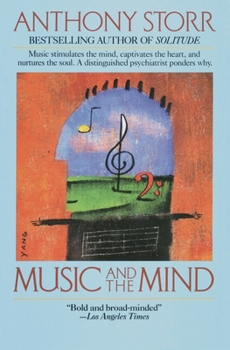Music and the Mind
Select Format
Select Condition 
Book Overview
"Writing with grace and clarity...he touches on everything from the evolution of the Western tonal system, to the Freudian theory of music as infantile escapism, to the differing roles o the right and... This description may be from another edition of this product.
Format:Paperback
Language:English
ISBN:0345383184
ISBN13:9780345383181
Release Date:October 1993
Publisher:Ballantine Books
Length:224 Pages
Weight:0.45 lbs.
Dimensions:0.5" x 5.1" x 8.0"
Customer Reviews
5 ratings
Music and the Mind
Published by Thriftbooks.com User , 17 years ago
The book was in great condition and I received it on time.
Staggering
Published by Thriftbooks.com User , 19 years ago
I did not know quite what to expect when i ordered this book. The only reason that i did so was because I needed to write my senior thesis and every applicable book at our library was gone. So, i opted just to buy this. After about 6 or 7 pages into the book, i knew that i had found something golden. Mr. Storr writes in a way that makes the text incredibly informative, yet still engaging and understandable. While not every aspect of the novel is covered thoroughly, it still will give enough information on almost any topic that you could possibly require. I highly recommend this book. It has opened my eyes to a world of philosophy that i hadn't even looked at until this time. I'm sure that you will find this as indispensable as i do.
The Muse of Music
Published by Thriftbooks.com User , 21 years ago
The author is an acclaimed psychiatrist whose personal life was very sad and lonely; he attributed his passion for music as the element which preserved his sanity and emotional equilibrium. Out of the many books he wrote, this was his favorite. He attempts to discover what it is about music that so profoundly affects us, and why it is such an important part of our culture. In doing so, he quotes a vast array of opinions; actually he draws more from what other peole have had to say about music than his own personal opinion.Storr sees music as subjective, emotional need for communication with other human beings; it structures time and brings order out of chaos, and it has a positive effect upon patients with neurological diseases. Physiologically, the emotional response is centered in the right hemisphere whilst the ability to appreciate structure and make critical judgments is located on the left side of the brain. He is of the opinion that music originates from the human brain rather than from the natural world and its universality depends on the urge to impose order upon our experience. He criticizes the dispute between formalists and expressionists since for him it is obvious that appreciation of both form and emotional significance enter into the experience of every listener and cannot be separated. Contrary to Freud's opinion, Storr holds that music is not an escape from reality but a means to structure our auditory perceptions and can also serve as a precursor to creative discovery.The last few chapters are dedicated to a philosophical analysis of the views held mainly by Schopenhauer, Jung, Nietszche with respect to music. Storr does not fully accept Schopenhauer's "unus mundus" or Jung's "pleroma," and is more inclined to accept Nietszche's concepts: music reconciles an individual to life and enhances it, it is physically and emotionally based, and it links the two principles of Apollo and Dionysus.Storr gives a historical, psychological, philosophical, and above all a passionate account of importance of music in the life of an individual. Quoting his own words, music is "something for the sake of which it is worthwhile to live on earth... it is an irreplaceable, transcendental blessing."
The Tao of Music
Published by Thriftbooks.com User , 23 years ago
Storr synthesizes his knowledge of biology, psychology, history and evolution and fuses it into a mindful musical journey. This is a thought provoking and comprehensive integration of music and the human psyche, and like many of Storr's books, it enhances your self awareness with each chapter.Whether, stimulating & arousing or relaxing & calming, music has enormous emotional power. Storr has written an eloquent treatise on how music serves as one of the bridges connecting mind and body.
Awesome!
Published by Thriftbooks.com User , 24 years ago
Storr begins with the ambitious task of answering the following question: why does a minor scale sound sad and why does a major scale sound happy? He takes the reader on an informative and thought provoking history of that examines the elements of music common to all societies and ultimately reaches his final and most important conclusion on the ultimate benefit we derive from music: peace, resolution and piece of mind. Storr's ultimate claim is that counterpoint in music and resolution does musically what people so often cannot do in real life: resolve opposing and competing forces.





